Throughout COP28, Butch Bacani, PSI Programme Leader, and Brandon Mathews, Global Coordinator for the PSI-managed V20 Sustainable Insurance Facility participated in events and meeting with stakeholders to amplify sustainable insurance thinking, practices and solutions in line with the aims of the Paris Agreement.
Please read below live updates from Butch Bacani, PSI Programme Leader, sharing key takeaways from COP28 relevant to PSI signatories and supporting institutions.
Day 1 | Day 2 | Day 3 | Day 4 | Day 5 | Day 6 | Day 7 | Day 8 | Day 9 | Day 10 | Day 11
Day 1: Loss and Damage
The historic decision on Day 1 of COP28 to operationalise the hashta LLoss and Damage (L&D) Fund was an important milestone and a major step in the right direction to urgently help vulnerable hashtagddeveloping countries. Given the magnitude of rapidly escalating losses & damages amid a warming planet, we need far greater financial resources to reach the most vulnerable communities with far greater speed.
The L&D Fund can be complemented by speeding & scaling up climate hashtag & hashtainsurance solutions across the micro (households), meso (MSMEs/cities) & macro (countries/regions) levels.
Join us for three hashtag events from 3-6 Dec that support these aims:
#1: Assessing progress & prospects of The Nairobi Declaration on Sustainable Insurance (NDSI)
3 Dec
0830–0930 GST
CARICOM: Caribbean Community Pavilion (Blue Zone)
This event will reflect on NDSI’s ambition to see Africa’s biggest climate & ESG risks addressed by its biggest risk managers. Hosted by NDSI & the Risk Pool Programme involving African Risk Capacity (ARC) Group, Caribbean Catastrophe Risk Insurance Facility (CCRIF SPC) & Pacific Catastrophe Risk Insurance Company (PCRIC). Speakers will include: Philip Lopokoiyit, Chair, NDSI & CEO, ICEA LION Group; Patty Karuaihe-Martin, MD, NamibRe; Lesley Ndlovu, CEO, African Risk Capacity (ARC) Group; Butch Bacani, Programme Leader, UN Environment Programme’s Principles for hashtagSustainable Insurance (hashtag((PSI) and Jacinda Washington Njike, UN Climate Champions Africa Finance Lead.
hS#2: The role of the insurance sector in climate adaptation
4 Dec
1630–1800 GST
German Pavilion (Blue Zone)
Recording available here: https://bit.ly/BMF-COP28
This event by the German Finance Ministry hashtagBMF) will focus on how insurers & regulators can strengthen climate change adaptation and close the protection gap. Speakers will include: Heiko Thoms, State Secretary, BMF; Günther Thallinger, Board Member, Allianz; Dr. Hubert Danso, CEO, Africa Investor Group; Pamela Schuermans, Principal Expert, European Insurance and Occupational Pensions Authority (EIOPA) and Butch Bacani, PSI Programme Leader, UNEP.
#3: Why do self-interested companies give their vendors climate insurance? Insights from the PSI’s hashtagV20 Sustainable Insurance Facility (V20-SIF)
6 Dec
1330-1430 GST
Sri Lanka Pavilion (Blue Zone)
hashtagMediMeMMicro, small and medium sized-enterprises (MSMEs) are vulnerable to extreme weather, creating costs to larger companies that rely on them to produce or sell goods and repay loans. Insurance solutions are ready and it’s a business decision for banks, manufacturers & other companies to protect their supply chains. Hosted by the hashtagV20 Finance Ministers & hashtagPSI, this event will highlight examples from the V20-SIF & provide insights from insurance hashtagbrokers. Speakers will include: Brandon Mathews, PSI V20-SIF Global Coordinator, UNEP; Sarah Ahmed, Global Lead & Finance Advisor, Climate Vulnerable Forum (CVF) & Vulnerable Twenty Group (V20); Francis Bouchard, MD, Marsh McLennan; Dominic Probyn, Director, Aon and Viktoria Seifert, Director, WTW.
Day 2: Resilient People, Resilient States: Strategies to strengthen climate resilience and amplify sustainable insurance – An event to launch the US National Association of Insurance Commissioners (NAIC) Climate Resilience Strategy and advance sustainable insurance
The PSI kicked off its COP28 activities on 1 December with a PSI event co-hosted by the California Department of Insurance (CDI) at the Climate Registry Pavilion. The event featured the announcement of the US National Association of Insurance Commissioners’ (NAIC) National Climate Resilience Strategy for Insurance, which was introduced by NAIC President, Chlora Lindley-Myers, Director of the Missouri Department of Commerce and Insurance; and presented by California Insurance Commissioner, Ricardo Lara.
Furthermore, the event included the announcement by Butch Bacani, regarding the first-ever Global Sustainable Insurance Summit. More details on the Summit will be provided in the coming weeks.
The event brought together regulators, policymakers, insurance industry leaders and the UN for a wide-ranging global discussion on climate change adaptation and mitigation. Other speakers included Mike Peterson, Deputy Commissioner, Climate & Sustainability, California Department of Insurance; Lesley Ndlovu, CEO of African Risk Capacity (a PSI signatory company); and Jean-François Tremblay, Canada’s Deputy Minister for Environment and Climate Change.
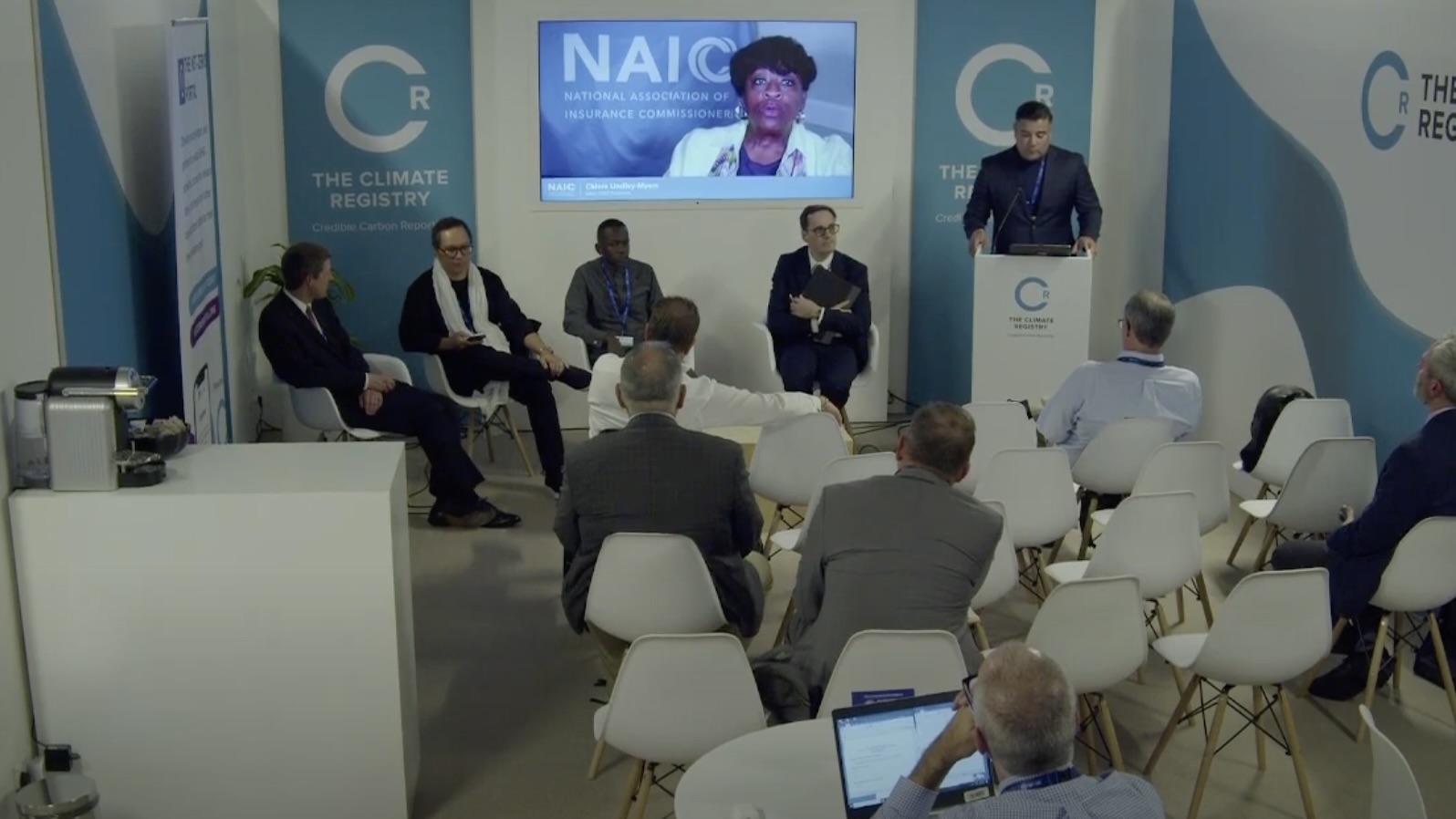 |
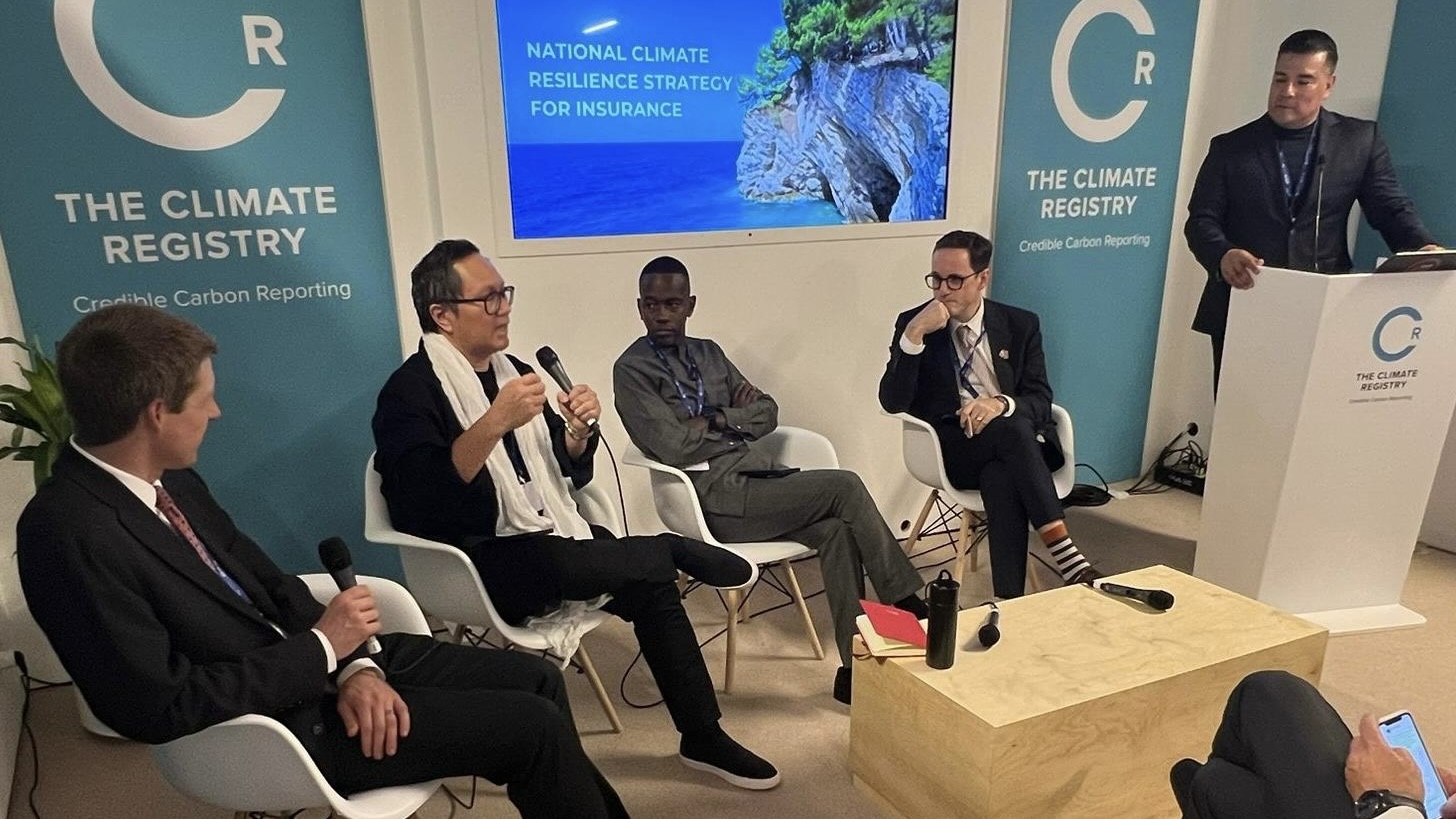 |
Day 3: UNDP Sustainable Insurance Forum’s Event “How transition finance underpins our net zero future”
As hashtagrisk managers, hashtagrisk carriers and hashtaginvestors, the global insurance industry—from insurers, reinsurers and brokers; through to insurance regulators and supervisors—has a key role to play in the transition to a hashtagnet zero emissions economy in order to limit global warming to 1.5°C and avoid the worst impacts of climate change.
This is why aside from insurance market participants, it is important to see a growing number of hashtaginsurance hashtagregulators and hashtagsupervisors in different jurisdictions taking a proactive role in supporting the transition. This includes the important work of the UNDP Sustainable Insurance Forum (SIF), the global network of insurance regulators and supervisors working together on sustainability challenges facing the insurance industry.
Looking forward to the COP28 UAE event tomorrow, “How hashtagtransition finance underpins our hashtagnet zero future”.
This UNDP SIF-hosted event will cover key themes in transition finance—including hashtagtransition plans by insurance companies—and will convene leaders from the public and private sectors for a high-level dialogue, delving into the financial solutions, products and architecture required to support the achievement of net-zero targets while maintaining social and economic balance.
Aside from Her Excellency Jennifer Carroll MacNeill TD, Minister of State at the Department of Finance Ireland, speakers include California Insurance Commissioner Ricardo Lara, who just presented yesterday the landmark US National Association of Insurance Commissioners (NAIC) hashtagClimateResilience Strategy at the hashtagCOP28 event of UN Environment Programme‘s Principles for Sustainable Insurance hashtagPSI) and the California Department of Insurance (a PSI supporting institution); Daniel Wang, Executive Director for Insurance at the Monetary Authority of Singapore (MAS), Chair of the SIF & Chair of the Climate Risk Steering Group of the IAIS – International Association of Insurance Supervisors ; Ian Johnston, CEO of the Dubai Financial Services Authority (DFSA); Claudine Blamey, Group Director of Sustainability at Aviva (a PSI signatory company); my UN colleague, Stephen Nolan, Head of the SIF Secretariat & Managing Director of UNDP Financial Centres for Sustainability (FC4S); and others.
Day 4: Progress Update on the Nairobi Declaration on Sustainable Insurance
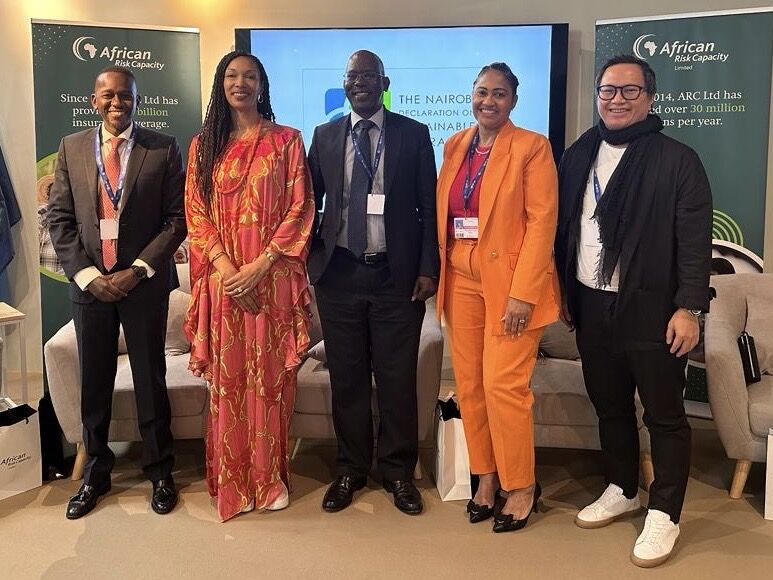
At COP28, it was brilliant to be with African CEOs to assess the progress of the 30-month-old The Nairobi Declaration on Sustainable Insurance hashtagNDSI) and next actions to amplify hashtagsustainable insurance.
The panel included hashtagPhilip Lopokoiyit, ICEA LION Group CEO & NDSI Chair; Patty Karuaihe-Martin, NamibRe MD; Lesley Ndlovu, African Risk Capacity (ARC) Group CEO; & myself; and was moderated by Jacinda Washington Njike, UN Climate Champions Africa Finance Lead. Kelvin Massingham, Risk & Resilience Director at FSD Africa, which serves as NDSI Secretariat, couldn’t join but was with us in spirit.
NDSI was initiated by UN Environment Programme‘s Principles for Sustainable Insurance hashtagPSI) in 2021 at the 4th PSI African Market Event in Nairobi. As with the PSI, the NDSI has given me a “Field of Dreams” movie moment—“If you build it, they will come.” The NDSI has grown to over 130 signatories from 27 countries.
It didn’t take long for me to write the actual text of the NDSI because I already knew what the PSI was doing. But we needed to put the PSI’s global work and hashtagSDGs in the context of Africa. This is similar to the process when we were drafting the PSI as global principles. The first regional consultation on the draft PSI took place in Africa in 2011—in Johannesburg to be exact. We wanted Africa to be the first. So the aim of initiating the NDSI was to create a vision & purpose tailored for African insurers & advance PSI aims with the SDGs as the North Star.
For the PSI, regional networks are key to advancing sustainable insurance. The PSI has already been embraced by many leading insurers. The next phase is for regional markets to write their own story, for the PSI to empower & support them in their sustainability journey. The NDSI story is not unique. There are PSI-initiated roadmaps & networks across the globe—from Brazil & Costa Rica; to Australia, California & Canada.
My 2030 vision for the NDSI, as I shared at the event, is for NDSI members to have progressed significantly in their quest for “self-actualization” as sustainable insurers. In practice, this means:
1. All NDSI members being PSI signatories
2. Effective hashtagESG strategies & risk management frameworks
3. Routine, decision-useful International Sustainability Standards Board (ISSB) climate disclosures & Taskforce on Nature-related Financial Disclosures (TNFD)
4. Credible net-zero & nature-positive metrics, targets & transition plans as insurers & investors
5. Insurance & investment portfolios aligned with SDGs with credible impact metrics
6. African insurers ranked as global sustainable insurance leaders
7. ARC, African Climate Risk Insurance Facility for Adaptation, PSI V20 Sustainable Insurance Facility, Global Shield against Climate Risks, and Loss & Damage Fund have enabled risk protection across micro, meso & macro levels
8. We’ve closed the protection gap; deepened & expanded sustainable insurance solutions & enabled climate-resilient prosperity in hashtagAfrica
Day 5: The role of the insurance sector in climate adaptation
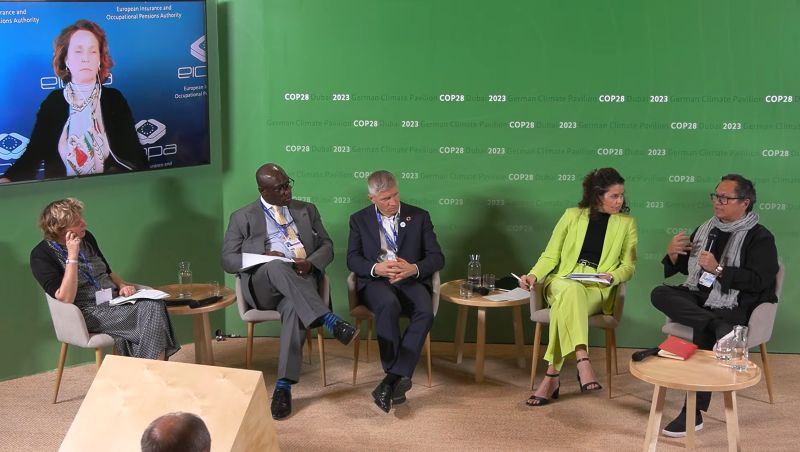
Thank you to the German Ministry of Finance (BMF) for continuing at COP28 the important discussion on the insurance industry’s role in climate change adaptation.
The event was opened by Heiko Thoms, State Secretary, BMF, followed by a discussion involving Günther Thallinger, Board Member, Allianz; Dr. Hubert Danso, CEO, Africa Investor Group; Pamela Schuermans, Principal Expert, European Insurance and Occupational Pensions Authority (EIOPA); Dr. Esther Wandel, Head of Division for Investment Funds & Sustainable Finance, BMF & myself. The event was moderated by Katie Gallus.
As we touched on adaptation & mitigation, I commented that they’re not competing concepts and can be both viewed as risk reduction. Not adapting entails greater risk of being affected by climate impacts. Mitigation, or reducing emissions, is risk reduction as it tackles the root cause of climate change.
As we transition to net zero, I stressed the equally urgent need for resilience. Over the past 2 decades, 20% of the wealth of V20 countries (68 climate-vulnerable countries) has been wiped out by climate-related losses & damages. And the climate crisis is perpetuating the debt crisis. As disasters strike with increasing frequency & intensity, countries are forced to borrow to replace bridges, homes & jobs that were lost.
While it was a milestone for COP28 to operationalise the Loss & Damage Fund, far greater financial resources are urgently needed. The estimated loss & damage ranges from about USD 400 billion for developing countries by 2030, rising to USD 1-2 trillion by 2050.
Recommendations I shared:
1) Use the insurance risk management continuum—understand, prevent, reduce and transfer risk—to promote a common language & make risk-informed decisions
2) Ministries of Finance, which oversee national insurance regulatory & supervisory authorities, should promote the recommendations of the 2023 report by IAIS – International Association of Insurance Supervisors : “The role of insurance supervisors in addressing natural catastrophe protection gaps”:
a) Assessing insurance protection gaps
b) Improving financial literacy and risk awareness
c) Incentivising risk prevention and reduction of insured losses
d) Creating an enabling regulatory and supervisory environment to support availability of insurance and uptake of coverage
e) Advising government and industry on financial inclusion and societal resilience, including on the design and implementation of public-private partnerships or insurance schemes
3) The Loss & Damage Fund should complement facilities that provide financial protection to the most vulnerable such as the PSI’s V20 Sustainable Insurance Facility, Global Shield against Climate Risks, African Risk Capacity (ARC) Group, Africa Climate Risk Insurance Facility for Adaptation (ACRIFA), CCRIF SPC, Pacific Catastrophe Risk Insurance Company (PCRIC) and SEADRIF Insurance Company
4) Harness the industry’s capacity to insure & invest in resilient and zero/low-emission infrastructure and technologies across sectors
Day 6: AIA’s progress in their sustainability journey
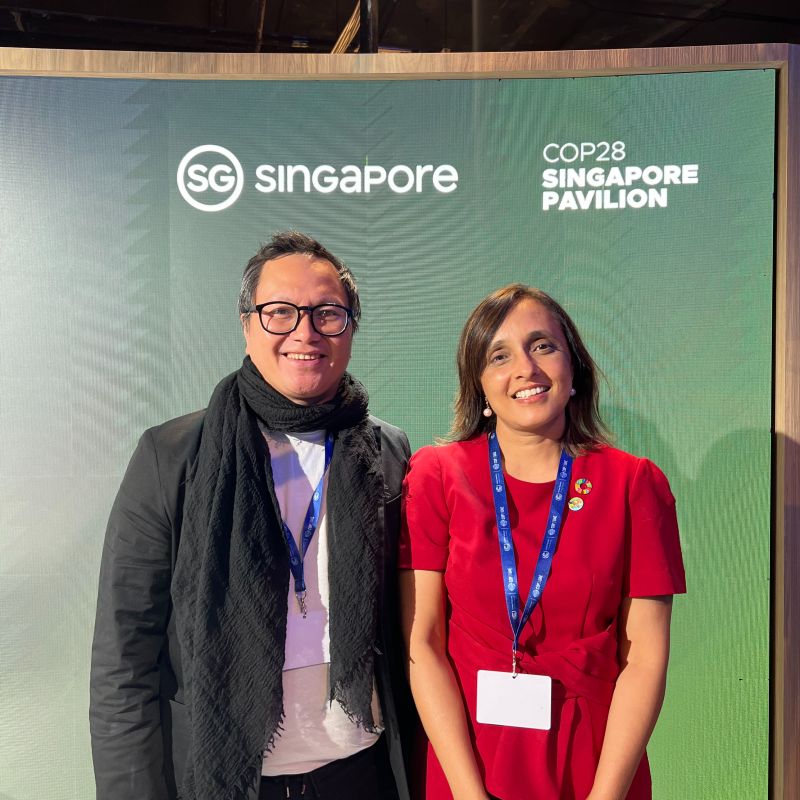
At COP28, it was wonderful to meet Amita Chaudhury, Group Head of Sustainability of AIA, who was recently elected to the Board of UN Environment Programme‘s Principles for Sustainable Insurance hashtagPSI). (Congrats, Amita!) AIA is the largest pan-Asian life & health insurer and one of the world’s largest insurers in terms of market capitalisation.
In a packed Singapore Pavilion, Amita presented AIA’s progress in their hashtagsustainability journey, marked by two milestones:
First, last November, AIA published its first climate hashtagtransition plan, which they aligned with frameworks developed by the Transition Plan Taskforce (TPT) and Glasgow Financial Alliance for Net Zero (GFANZ).
Second, AIA became the first pan-Asian life & health insurer to have their near-term science-based emissions reduction targets hashtagvalidated by the Science Based Targets initiative hashtagSBTi). These targets serve as AIA’s north star in their decarbonisation journey.
For more info, click here.
It was also insightful to hear the thoughts of Mitchell New, AIA’s Group General Counsel & Chair of ESG Committee, who had a fireside chat with Luiz Fernando do Amaral, CEO of SBTi; as well as Dr Mark Konyn, AIA’s Group Chief Investment Officer, and Dr Kelvin Loh, AIA’s Group Chief Healthcare Officer.
Last year, at the PSI’s 10th anniversary event, the PSI launched the first-ever environmental, social & governance (hashtag(SG) guide for the global life & health insurance industry. AIA was a member of the PSI Life & Health Working Group, chaired by Edward Moncreiffe, CEO of HSBC Insurance (Asia) & HSBC Life (Int’l), that produced that landmark guide.
In parting, let me quote text from AIA’s first climate transition plan:
***
“Achieving net-zero emissions by the mid-century is especially critical for Asia. The continent is home to 60 per cent of the world’s population and a vital driver of economic growth. Even with a temperature increase of around 1°C above the Paris-aligned 1.5°C could see a 20.4 per cent dip in Asian GDP as a result of damage to infrastructure, obstructions to supply chains and labour shortages. Currently, 85 per cent of Asia’s energy is derived from fossil fuels, underscoring the urgent need for a swift and effective energy transition. The cost of inaction is large. Timely and decisive interventions are imperative for a comprehensive and just transition in Asia and beyond.”
“As the largest pan-Asian life & health insurer, AIA has a responsibility to contribute to a healthier, sustainable and inclusive future for the region. We believe that a programme of action to deliver on this vision must be comprehensive and include credible and ambitious targets.”
***
At a time when the world is facing a triple planetary crisis of hashtagclimate change, hashtagnature loss and hashtagpollution, it’s good to see insurers such as AIA hashtaglead by example, and with hashtagcourage. We hope many more insurers around the world will follow suit.
Day 7: Why do self-interested companies give their vendors climate insurance? Insights from the PSI-managed V20 Sustainable Insurance Facility
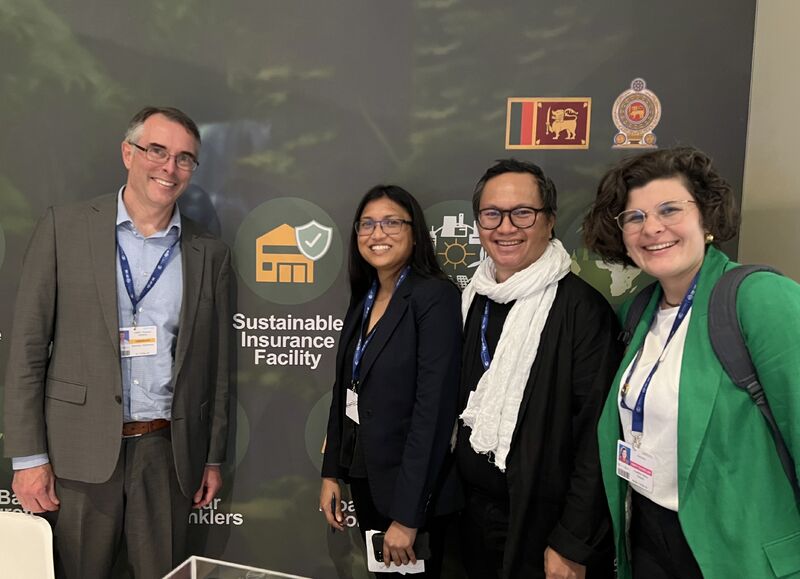
The Vulnerable Twenty Group of Ministers of Finance (V20) —originally 20 and now 68 climate-vulnerable nations in the Global South—has a combined population of 1.7 billion, 5% share of global emissions and GDP value of USD 3.8 trillion.
Micro, small & medium-sized enterprises (MSMEs) are the backbone of V20 economies. They contribute 20%-70% of GDP & to export revenues, & make up over 80% of businesses. But MSMEs are constantly threatened by escalating climate risks. Insurance can enhance risk management, absorb financial shocks & de-risk cost-saving renewable energy & energy efficiency infrastructure.
At the V20 Asia-Pacific Meeting in Manila in 2017, I broached the idea of a world’s first vulnerable country-led insurance facility of its kind. Working together with the V20 and Munich Climate Insurance Initiative in the ensuing years, we announced at COP26 the operationalisation of the V20 SustainableInsuranceFacility (V20-SIF)—a project pipeline development facility to assist V20 economies scope the financial protection needs of MSMEs & facilitate concept & proposal development for funding vehicles. A V20-SIF Office hosted by UN Environment Programme‘s Principles for Sustainable Insurance (PSI) was then set up with funding from the German Ministry for Economic Cooperation & Development (BMZ), and we completed our global team of experts this year.
This is why at COP28, having developed a pipeline of projects spanning Africa, Asia-Pacific and Latin America & the Caribbean, we shared lessons in the V20-SIF journey to date.
For example, we believe that “demand aggregators”—such as banks, MFIs, digital platforms and agri-buyers—are key to insuring MSMEs that form part of supply chains and loan portfolios. MSMEs are highly vulnerable to climate risks, creating costs to larger companies (demand aggregators) that trade with and rely on MSMEs to produce or sell goods and/or repay loans. Demand aggregators’ financial performance is impacted by MSMEs’ risks & most want to offer insurance. But costs in serving MSMEs—whether via demand aggregators, brokers or insurers—is a major barrier & must reduce significantly.
The V20-SIF’s goal is not to do more market diagnostics or pilots, but to understand key elements that work and can be replicated to scale & speed up insurance solutions that build climate resilient MSMEs, in line with the underlying tenet of the SDGs of leaving no one behind.
Sincere thanks to:
-Our COP28 event speakers—my UNEP colleague, Brandon Mathews, V20-SIF Global Coordinator; Sara Ahmed, V20 Finance Advisor; Liz Henderson, Head, Climate Risk Advisory & Catastrophe Analytics, Aon; & Viktoria Seifert, Director, Disaster Risk Finance & Parametrics, WTW.
-The rest of the V20-SIF team: Diana Rono Wainaina, Africa Coordinator; Manoj Pandey, Asia-Pacific Coordinator; Gabriel Pérez Salguera, Latin America & the Caribbean Coordinator; & Reace Novello, Communications Officer.
-The Sri Lankan government for hosting our event.
Day 8: Meeting with the Brazilian Insurance Confederation (CNseg)
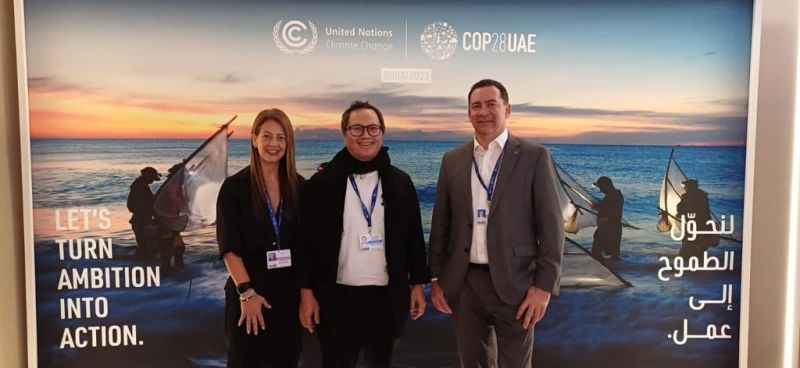
The United Nations Principles for Sustainable Insurance hashtagPSI were born on the shores of Ipanema and Copacabana during the 2012 UN Conference on Sustainable Development, or the “Rio+20 Conference”. Rio+20 marked the 20th anniversary of the 1992 hashtagRio Earth Summit, which produced important global frameworks for sustainable development, including the UN Framework Convention on Climate Change hashtagUNFCCC) (which led to the Paris Agreement on Climate Change) and the UN Convention on Biological Diversity hashtagCBD) (which led to the Kunming-Montreal Global Biodiversity Framework). The PSI launch event was co-hosted by the International Insurance Society and the Brazilian Insurance Confederation (CNseg – Confederação Nacional das Seguradoras).
This is why here at COP28 UAE, it was an honour and a pleasure to meet Dyogo Oliveira (President of CNseg) and Ana Paula de Almeida Santos (Sustainability Director of CNseg)—as well as Amanda Burlamaqui ️, who used to be with SulAmérica and now with the Brazilian Financial & Capital Markets Association (ANBIMA), and some of Brazil’s indigenous people!
Dyogo spoke on 3 December at the launch of the pioneering report, “hashtagJust Transition Finance: Pathways for hashtagbanking and hashtaginsurance“, produced by the International Labour Organization and United Nations Environment Programme Finance Initiative (UNEP FI) and supported by PSI signatories. Read the report here.
Moreover, Dyogo, Ana Paula and I agreed on strategies and actions to amplify hashtagsustainable insurance in Brazil and the wider Latin American region in the run up to Brazil’s hashtagG20 Presidency and the hashtagUNEP FI Regional Roundtable for Latin America & the Caribbean in Bogota, Colombia, both in 2024; hashtagCOP30 in Belem, Brazil and the biennial conference of the Inter-American Federation of Insurance Companies (hashtagFIDES) in Costa Rica, both in 2025. We’d like to turn ambition into action. Stay tuned for developments.
We are grateful for CNseg’s unwavering support for the PSI over the years. The Principles for Sustainable Insurance are global, but there are some PSI details that will always remain local:
Date & place of birth of the PSI: 19 June 2012, Rio de Janeiro, Brazil
Day 9: Aligning competition policy with global sustainability goals to enable private sector cooperation
It’s good to know that COP28 has an event that will address the links between hashtagcompetition policy, global hashtagsustainability goals, and private sector hashtagcooperation.
Event: Aligning competition policy with global sustainability goals to enable private sector cooperation
Date: 8 December
Time: 1030-1130 GST
Venue: Chez ICC Auditorium (Blue Zone), B6, Building 76
The session will be moderated by Georgina Beasley, CEO, Net Zero Lawyers Alliance. Speakers will include, Stientje van Veldhoven, Vice President & Regional Director for Europe, World Resources Institute (former Dutch Environment Minister); Maurits Dolmans, Partner, Cleary Gottlieb Steen & Hamilton LLP and Fiona Macklin, Senior Advisor – Groundswell, Global Optimism
In 2022, the International Chamber of Commerce (ICC) called on governments, legislators and competition authorities to maximise efforts in aligning competition policies with global sustainability goals. While barriers to business collaboration in the fight against climate change persist in 2023, the tide is slowly turning. Governments are working with business to provide clearer guidelines on how they can collaborate without fear of repercussions. Increasingly, businesses are given a “green light” to work together to clean up their supply chains, fight climate change and put their industries on a more sustainable basis. A new ICC progress report presents a snapshot of latest key developments in the antitrust/competition space and concludes that more can and needs to be done.
Read also a relevant paper, “Sustainability and Net-Zero Climate Agreements – A Transatlantic Antitrust Perspective”, by Maurits Dolmans, Wanjie Lin and Jessica H. from the law firm, Cleary Gottlieb Steen & Hamilton LLP.
Day 10: Nature Positive for Climate Action
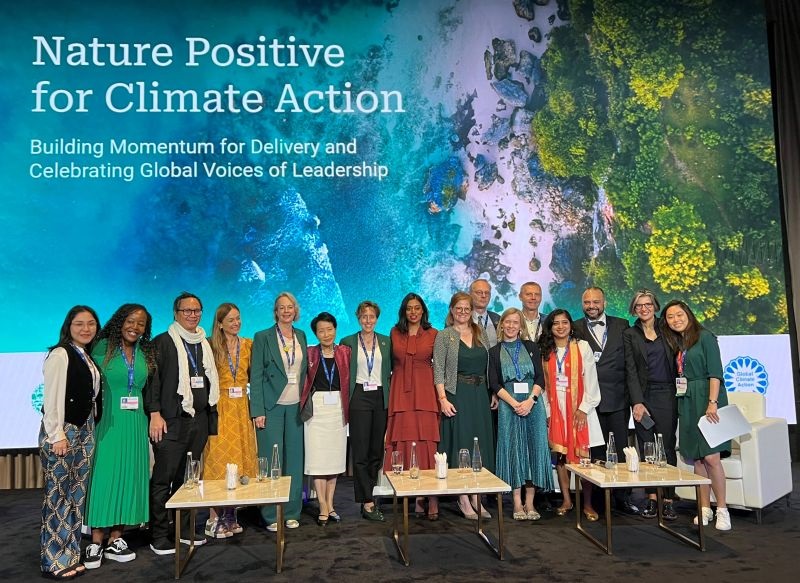
1. Finance underpins the real economy. If the economy were net zero & nature positive, finance would be too. But it’s not. Simplistically, financial flows—be it lending, insurance or investment—lead to emissions or emissions reduction & lead to nature-negative or nature-positive outcomes.
2. The net-zero finance train has left the station via UNEP FI initiatives on banking, insurance & investment & the Glasgow Financial Alliance for Net Zero (GFANZ). At COP28, the Net-Zero Export Credit Agencies Alliance was launched. These are important steps but there’s a long way to go. Equally, financial regulators who create the “rules of the game” must do their part in supporting the transition.
3. The nature-positive finance train is quickly following. Building on the TCFD & ISSB climate disclosures, the Taskforce on Nature-related Financial Disclosures (TNFD) has been integral. UNEP FI is starting its TNFD implementation programme for banks & insurers in 2024, after the TNFD pilots it did over the past years.
4. Mainstreaming TNFD disclosures, embedding nature in ESG risk management, developing nature metrics & setting targets for lending, insurance & investment portfolios, and integrating nature into climate transition plans are key to amplifying nature-positive finance.
5. The UN Principles for Sustainable Insurance (PSI) is building on its nature work over the past decade—from tackling IUUfishing, environmental pollution liability, plastic pollution & high-impact hydro power; to protecting UNESCO World Heritage Sites, building climate resilience by protecting ecosystems & including nature in the first (ESG) guides for insurance.
Read the PSI paper to advance Nature Positive Insurance here.
See PSI’s work on nature.
See UNEP FI’s work on nature.
Support nature now.
Day 11: What are the links between food systems, agriculture and climate change?
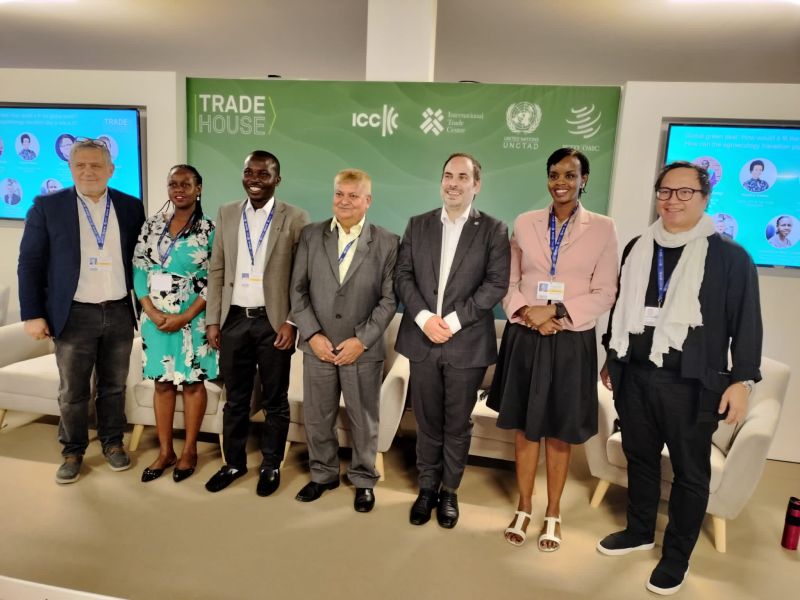
My last event at COP28 was not the least. It involved some of the most vulnerable being left behind—smallholder farmers & micro, small and medium-sized enterprises (MSMEs) in the Global South.
Agriculture feeds 8 billion people & makes up 4% of GDP & 25% of emissions. Livelihoods of over 500 million smallholders are dependent on this sector. As countries design trade measures to address climate goals, their impacts on sectors must be understood. Many producers’ orgs, smallholder farmers, agri-MSMEs & rural communities are providing sustainable & inclusive solutions to transform food-agri systems but are vulnerable to climate impacts.
It’s important that over 130 countries signed the “Declaration on Sustainable Agriculture, Resilient Food Systems & Climate Action” at COP28.
Co-hosted by International Trade Centre (ITC), UN Environment Programme (UNEP) and Fairtrade International, we discussed how agroecology could guide the transition to inclusive, resilient & sustainable food & agri systems.
The session was moderated by Hernan Manson, Head, Inclusive Agribusiness Systems, ITC. Speakers included, Owomuhangi Innocent, Tea farmer & Standards Officer, Kayonza Growers Tea Factory, Uganda; Sandra Uwera Murasa, Global CEO, Fairtrade International; Dinesh Prasad Parajuli, MD, Agri Enterprise Ctr, Fed’n of Nepalese Chambers of Commerce & Industries; Josephine Akia, Country Coordinator, Participatory Eco Land Use Mgt (PELUM Uganda); Mario Cerutti, Chief Institutional Relations & Sustainability Officer, Lavazza Group; & myself.
Here are some of the thoughts I shared on how UNEP’s work on trade, finance & insurance can help:
1. In the past 20 yrs, global trade in agri-products has more than tripled to $1.5 trillion in 2018 but the environmental footprint of the agri sector has been perpetuated by perverse public incentives. Gov’ts spend nearly $540 billion yearly on price incentives & fiscal subsidies, or 15% of total agri production value. Of this, 87% includes price distorting measures that harm the env’t & human health. Such support could reach almost $1.8 trillion by 2030. Repurposing subsidies can transform & strengthen the resilience of food systems & freed-up fiscal space could finance nature-based solutions, social safety nets, R&D & infra investments for agri-goods & services & sustainable agri practices.
2. Reg’l trade agreements, trade preferences & market access concessions on goods should encourage trade of sustainable & biotrade agri-products & services.
3. Banks, insurers & export credit agencies should align their trade finance with net zero: 80-90% of trade ops rely on trade finance. Members of UNEP net-zero finance initiatives are transitioning lending, insurance & investment portfolios to reduce emissions across sectors, including agri, energy & shipping. At COP28, UNEP launched the Net-Zero Export Credit Agencies Alliance.
4. UNEP’s V20 SustainableInsurance Facility (V20 SIF) is for MSMEs. The V20 SIF is a major opportunity to ensure that smallholder farmers and MSMEs are resilient and not left behind.



Net zero and nature positive are two sides of the same coin, just like climate change mitigation and adaptation.Nature positive is a global goal defined as “halt & reverse nature loss by 2030 on a 2020 baseline & achieve full recovery by 2050”. It means ensuring more nature in the world in 2030 than in 2020 and continued recovery after that. The science is clear. The world cannot reach net zero without becoming nature positive. Neither climate change nor biodiversity loss will be solved in isolation as they mutually reinforce each other and are interconnected. The science was reaffirmed by Johan Rockström, Director of PIK – Potsdam Institute for Climate Impact Research at the “Nature Positive for Climate Action” event I participated in at COP28, which was opened by Manuel Pulgar-Vidal, Nature Action Agenda Champion at UN Convention on Biological Diversity (CBD).Some thoughts I shared during the panel moderated by Eva Zabey (Business for Nature) involving Angela Pinhati (Natura); José Pugas (JGP Asset Mgt); Rob Cameron (Nestlé) & myself.